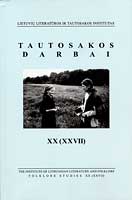Iš dainų poetikos: vyno įvaizdis ir jo kontekstas
Out of folk songs poetics: the image of wine and its context
Author(s): Bronė StundžienėSubject(s): Customs / Folklore
Published by: Lietuvių literatūros ir tautosakos institutas
Keywords: Lithuanian folk songs; sogs poetix; image; wine; customs; rituals
Summary/Abstract: The aim of the article is to discuss the whole wine-related tradition in Lithuanian culture and investigate its reflections in Lithuanian folk songs. After having analyzed what kind of wine, when and to what extent it had been used in Lithuania during calendar, work and family festivals, the author makes a conclusion that although Hungarian, French, Italian, and Rhenish wine had been imported to Lithuania since the 16th century, it has never really overshadowed the ancient and established tradition of drinking mead, beer, and schnapps / vodka. Still, in Lithuanian folk songs the image of wine and various poetical situations created around it are quite numerous. Such popularity of wine in folk songs poetics was determined by high cultural prestige of wine, inherited from countries with highly developed wine industry. Lithuanian folk songs most probably inherited wine code from Slavonic traditions, and interpreted it in their own way. Stereotypic formulae and semantically related inclusions of wine, constantly repeated in similar situations, provoke interpreting them as a meta-history of wine formed solely in the folklore sphere. Such interpretation is supported by several separate blocks of independent motives, detached from songs and provisionally interrelated. Their functions embrace quite a broad scope: from drawing an idealized history of wine, asserting its high status in the verbal rites and its real role in the legal practices, till small details, related simply and solely to drinking. The first block of motives is not numerous and does not have clearly developed plot scheme: the history of wine in folk songs is described by fits and starts only. If mentioning its origin at all, folk songs describe wine as expensive, fancy drink, brought from far away. Wine is associated with the vision of urban, “genteel” life, songs mention acquiring it from the “royal wine-cellar”, etc. Wine is placed at the very peak of its ritual glorification. Therefore flowing of wine in Lithuanian folk songs often resembles a miracle, the great mystery of wine being ascribed to the sacral powers of the maidenhood: Ėjo merga vyno leisti, Pati savim dyvojos, Iš kur vynas tekėjo: Ar iš baltų rankužių, Ar iš aukso žiedužio? Ne iš aukso žiedužio, Tik iš deimanto akužės, Iš deimanto akužės – Į ąžuolo bonkužę (‘The maiden went to get wine, wondering at herself: Where from did the wine flow? Did it flow from the white hands, or from the golden ring? Not from the golden ring, just from its diamond eye, and straight into the oaken bottle’). Another block of wine-related motives comprises several different levels of poetic glorifications at wedding rituals. Among them, poetic phrase žalias vynas (‘young wine’, literary ‘green wine’) is especially outstanding. This lexical compound, borrowed and translated directly from Slavic languages (Russian, Byelorussian, Ukrainian), has acquired special connotations in Lithuanian poetics...
Journal: Tautosakos darbai
- Issue Year: 2004
- Issue No: 27
- Page Range: 28-44
- Page Count: 17
- Language: Lithuanian

